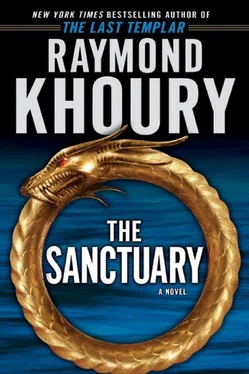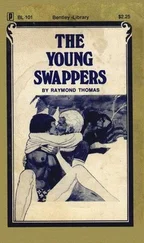“Sounds like it.”
Mia put the phone down, fighting with the notion that the mad scientist tag that she’d been keeping at bay when thinking of the man who held her mother, probably wasn’t far from the truth.
The hakeem sank back in the armchair of his study, feeling blissfully invigorated.
The morning’s treatment, a weekly regimen he had religiously followed for years, had given him its customary boost. He relished the crisp autumn air, breathing it in with big, hungry gulps as the cocktail of hormones and steroids coursed through his veins and made his skin feel as if it were electrified. The rush cleared his head and his eyes and heightened his senses, almost slowing down everything around him. It was the best high he could possibly imagine, especially since it didn’t involve his losing control, something that would, for him, be inconceivable.
If only people knew what they were missing.
In addition, the news from Beirut was promising. Omar and his men had grabbed the assistant professor. One of them had been killed, another badly wounded — he would have to be taken care of, as a trip to a hospital, even one in a friendly part of town, was out of the question, and he was apparently too badly wounded to be sneaked over the border — but, all in all, the operation had been successful.
It was a shame the American hadn’t been killed. The hakeem sensed that the man’s interest was becoming a problem. He was too close to the situation, too…committed. Omar had informed the hakeem that the American had taken the Bishop woman’s laptop, as well as a file, from her apartment. One file. Standard procedure in such an investigation, or was there more to it? Yes, admittedly, an American woman had been abducted, and the Americans took such things more seriously than most, but the man’s stubborn determination hinted at something more personal at work.
Did he know what was really at stake?
He’d ordered Omar to take extra precautions from here on. The Iraqi dealer’s phone call was imminent. The book would soon be his.
Things were looking good.
Better than good.
Somehow, with the clarity afforded to him by the fresh dose swirling inside him, he knew that this time, finally, he really was close.
He shut his eyes and sucked in a deep breath, relishing the prospect of imminent success. With his mind gliding along unhindered, images of home soon swooped into his mind.
Reminiscences.
Of the first time he’d taken notice of the chapel’s unusual offerings.
The first time he became aware of his unique heritage.
* * *
He’d been inside the chapel before, of course. He’d grown up there, in Naples, a city where, to this day, his ancestor’s name was still whispered in hushed tones. But that visit, at the age of nine, had awoken him to the mysteries of his past.
His grandfather had taken him to the chapel that day.
He enjoyed spending time with the old man. There was something solid and comforting about him. Even at that tender age, the young boy — his name was Ludovico, back then — could sense the respect his grandfather commanded from those around him. He yearned for that inner strength himself, especially in the playground at school, where bigger, stronger boys would taunt him because of his ancestry.
In Naples, the di Sangro cross was a heavy one to bear.
His grandfather had taught him to stand proud and take note of his family’s heritage. They were princes, for God’s sake, and besides, geniuses and visionaries were often derided and persecuted in their own time. Ludovico’s father hadn’t been interested in understanding what lay in their past, choosing to remain weakly and embarrassingly apologetic about his lineage. Ludovico had been different, and his grandfather had seen it in the young boy and nurtured it. Their ancestor had many startling achievements, he’d taught him. Yes, he’d been called everything from a sorcerer to a diabolical alchemist. Rumors abounded that he’d performed vile experiments on unwitting subjects. Some believed these were related to perfecting the creation of even better castrati, the illegally castrated singers that entranced audiences and drove Italian opera to prominence in the seventeenth and eighteenth centuries. Some went further, claiming that the prince had ordered the killing of seven cardinals who took displeasure with his interests and had chairs made from their bones and skin.
As far as his grandfather was concerned, such talk was indicative of the limited intellect and imagination, and inevitably the jealousy, of Raimondo di Sangro’s detractors. After all, their ancestor had belonged to the prestigious Accademia della Crusca, the highly esteemed club of Italy’s literary elite. He’d invented new types of firearms such as a rear-loaded shotgun, as well as revolutionary fireworks. He’d created waterproof fabrics and perfected new techniques for coloring marble and glass. Far more than that, however, he’d created a monument of immortal power: the Cappella San Severo, his personal chapel in the heart of Naples.
The hakeem remembered that fateful visit with his grandfather. Set low in the chapel’s outer walls, by the entrance, were the barred cellar windows to what was once the prince’s laboratory. Inside, the small baroque church was resplendent with the most unique paintings and works of art. Marble statues, the most famous of which was Sammartino’s Veiled Christ , were mesmerizing in their detail, the features on their subjects’ faces clearly visible under a thin veil of marble. To this day, experts are puzzled as to how such an effect was achieved.
His grandfather had guided him beyond it, to Queirolo’s statue Disillusionment . Another veiled wonder, it showed the prince’s father trying to free himself from the confines of a net, aided by a winged youth. The hakeem’s grandfather had explained to the young boy how the statue represented man trying to free himself from the trap of false beliefs, aided by his intellect.
The basement housed more marvels. A narrow spiral staircase led down to the prince’s laboratory, where two glass cases held the infamous “anatomical machines,” skeletons of a man, on one side, and a heavily pregnant woman on the other, the veins, arteries, and organs of their entire circulatory systems immaculately preserved using an unknown and still-perplexing embalming technique.
Over the years, his grandfather had taught young Ludovico more about his ancestor’s mysterious life. The principe had, his grandfather told him, been obsessed with attaining human perfection. The castrati were perfect singers. The anatomical machines were part of his quest to create the perfect human body. His tombstone, fittingly, read, “An admirable man, born to dare everything.” It presided over an empty tomb: His body had been stolen. But at some point in his life, his obsession had taken a dramatic turn. And when Ludovico reached eighteen, his grandfather finally told him what had inflamed his ancestor’s obsession.
He also gave him Raimundo di Sangro’s diaries, as well as something else that he’d prized above all else: a talisman, a medallion bearing the mark of a tail-eating snake, one the young man would always wear, even to this day.
The revelation inspired Ludovico beyond his grandfather’s greatest dreams — or worst nightmares.
It had started off well enough. Ludovico had excelled in his studies and had gone on to the University of Padua, where he obtained a doctorate — with honors — in geriatric medicine and in cellular biology. By now a brilliant biogeneticist with a solid reputation, he ran a well-funded research lab at the university, exploring stem cells, hormonal pathways, and cellular breakdown. But, with time, he started to feel the constraints of acceptable science. He began to push the envelope and to challenge the accepted boundaries of bioethics. His experiments grew more adventurous. More extreme.
Читать дальше












